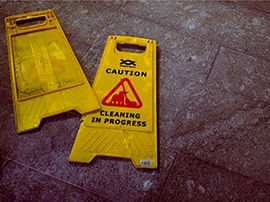Stewart & Stewart – Indianapolis
According to the National Hospital Ambulatory Medical Care Survey, in 2018 there were 24.5 million cases of unintentional injury that resulted in an emergency room visit. Our Indianapolis personal injury lawyers know that such injuries are so prevalent, they are the third largest cause of death in the country – behind only heart disease and cancer.
If you have suffered a personal injury in Indianapolis that has caused a loss of wages, excess medical bills or other issues, you need an Indianapolis personal injury attorney to get you the compensation you deserve. The skilled team at Stewart & Stewart Attorneys is ready and willing to give your case the care and attention it deserves.
Your first conversation with us is free with no obligation. Give us a call or fill out our free online consultation form to find out how we can help after your Indianapolis personal injury.
24/7 – Free Emergency Consultation
Hire An Indianapolis Personal Injury Attorney – Free Consultation
 “No Fee Unless You Win”
“No Fee Unless You Win”
Start Here
Fill out the short form below to get help from a Stewart & Stewart intake specialist.
Injury Lawyers located in Indianapolis, Indiana
We are determined to hold negligent parties responsible for their harmful actions and will do what it takes to secure the compensation victims deserve for their injuries.
Stewart & Stewart is an Indianapolis personal injury law firm committed to protecting the rights of injured victims throughout Indiana. To provide the best service, our Indianapolis injury law firm has offices located in Carmel, Indianapolis, and Anderson, and we have successfully advocated for clients throughout Indiana, including Fort Wayne, Gary, Indianapolis, South Bend, and Greenwood.
If you’ve suffered a injury, contact the injury attorneys at Stewart & Stewart. Our team of experienced Indianapolis personal injury lawyers will stand up to insurance adjusters to ensure you get the money you need to cover medical bills, lost wages, property damage, future costs, and pain and suffering.
“No Fee Unless You Win”
Call An Indianapolis Personal Injury Lawyer Today at 866-925-3071

About Indianapolis
The state capital and largest city of Indiana is Indianapolis. It’s the county seat of Marion County, too. Estimates from the United States Census Bureau put the combined population of Indianapolis and Marion County in 2019 at 886,220.
In terms of population, it ranks 16th in the United States and fourth in the Midwest, behind only Chicago, Houston, and Columbus. Larger than San Francisco but smaller than Jacksonville, Florida, Indianapolis has a total land area of 368 square miles (950 km2), making it the sixteenth largest city in the United States.
With a population of 2,048,703, the Indianapolis metro area ranks as the 34th most populous MSA in the United States. As the 28th most populous MSA in the country, it has a total of 2,431,361 people. Because of its central location in the state, Indianapolis is a major distribution center for Indiana and much of Central Indiana.
Several monuments, museums, memorials, parks, and public art pieces can be found in the city’s bustling center. Indianapolis’ skyline is dominated by the iconic Soldiers’ and Sailors’ Monument. There is only one level of government in Marion County, and it is headquartered in the City-County Building. The Indiana Statehouse serves as the state’s official “capitol.” The city has played host to international multi-sport events such as the 1987 Pan American Games and the 2001 World Championships in Athletics.
Practice Areas
All Practice Areas
3M Ear Plugs
Acetominophen Liver Damage
Airbags
Antidepressant Birth Defects
Asbestos
Attune Knee Replacements
Auto Accident
Bair Hugger™ Warming Blanket
Benicar®
Benzene
Birth and Child Injury
Bone Cement
Brain Injury
Camp LeJeune Water Contamination
Defective Ignition Switches
Defective Product
Diabetes Drugs Linked to Cancer
Dog Bite
Drug Injury
E-Cigarette Injuries
Elmiron
Endoscope Bacterial Infections
Environmental Disasters
Farm Equipment Injury
Fire and Burn Injury
Hernia Mesh
Insurance Dispute
Invokana® and Invokamet®
IVC Filters
Johnson & Johnson Talcum Powder
Lipitor®
Low T
Medical Malpractice
Mesothelioma
Metal-on-Metal Hip Injuries
Motorcycle Accident
Morcellator Cancer
Neutrogena Sunscreen
Nursing Home Abuse
Onglyza®
Opioid Addiction
Paraquat
Personal Injury
Proton Pump Inhibitors
Risperdal®
Roundup / Glyphosate
Slip and Fall
Social Security Disability
Stevens-Johnson Syndrome
Talc Ovarian Cancer
Taxotere
Tires
Train Accident
Truck Accident
Truck Cab Guards
Unintended Acceleration
Veterans Disability
Viagra® Melanoma
Wage and Hour
Water Contamination
Workers’ Compensation
Wrongful Death
Wrongful Termination
Zantac
Zimmer Persona® Knee
Zofran®
Frequently Asked Questions
Why do I need a personal injury attorney?
Am I able to sue someone for a personal injury in Indiana?
What should I know before I file a personal injury claim?
- Always get medical attention
- Call the police
- Get copies of all reports
These three steps are vital in building a valid personal injury claim. They can be the difference between a successful insurance claim and one that is denied. If you need to go to trial, the medical documentation and police reports you obtain will become the cornerstone of the case your personal injury attorney builds. Once you have taken these steps, there are more steps to take and more information you should know. To learn more about this topic, read our article titled “5 Things to Consider When Filing a Personal Injury Claim“
How do personal injury settlements work?
What types of damages does a personal injury lawsuit cover?
What is the difference between bodily injuy and personal injury?
What happens when you win a personal injury settlement?
Do insurance companies automatically compensate for pain and suffering?
How are pain and suffering damages calculated?
Latest Resources
Trust the Experts
Can I Receive Compensation If I Was a Passenger in a DUI Accident?
Were you a passenger in a car that was hit by a drunk driver in Indiana? If so, you might...
How Are Commercial Truck Accident Claims Different?
Are you preparing to file a commercial truck accident claim? You should know that filing this...
What If I Slipped on Wet Floors Without Warning Signs?
If you slipped on wet floors without warning signs in a grocery store, a pharmacy, or another...
Free Initial Consultation
Get Stewart Today
If you have been involved in an Indiana personal injury accident, contact us at Stewart & Stewart Attorneys. Our Indiana personal injury lawyers represent victims throughout the state, including Carmel and Anderson. We have also successfully advocated for clients throughout the area, including Fort Wayne, Gary, Indianapolis, South Bend. Complete a free online consultation form or call us at (800) 33-33-LAW!
Stewart & Stewart Attorneys have the knowledge and experience to defend your rights in the following areas of Indiana injury law: auto accident, brain injury, drug injury, defective product, fire and burn injury, insurance dispute, medical malpractice, motorcycle accident, nursing home abuse, slip and fall, truck accident, workers’ compensation and wrongful death.








